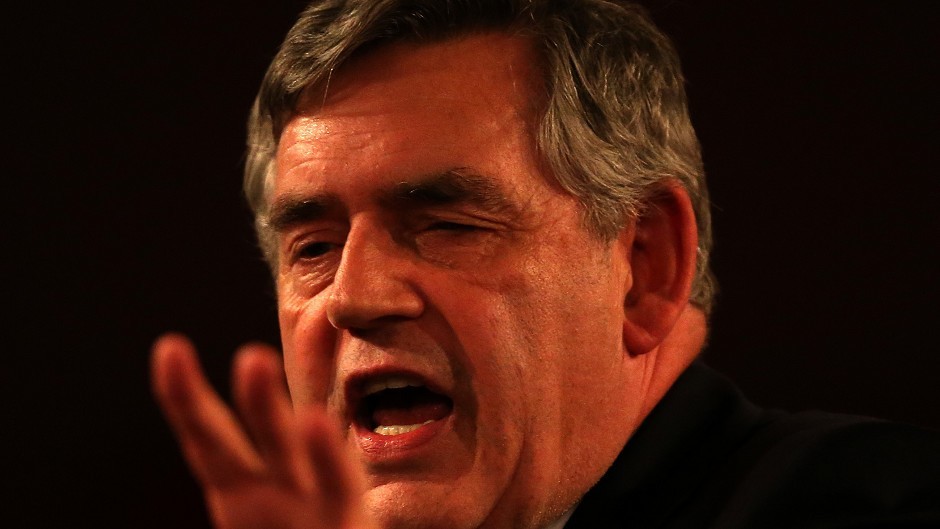The UK faces a fresh threat to its existence because of the deep divisions over plans for a constitutional shake-up, it was claimed yesterday.
Former Prime Minister Gordon Brown warned that the Union would be “all but over” if the Tories pressed forward with proposals he said would leave Scotland with second-class MPs.
But Conservative minister William Hague said the “greater danger” to Britain’s future would be if English-only votes at Westminster were denied.
The claims and counter-claims were made during bitter exchanges in the Commons over the delivery of promises made to Scots in the run-up to last month’s referendum.
Battle-lines were drawn and hopes of a consensus appeared dashed as Tory back-benchers lined up to demand Scottish MPs be banned from voting on English-only matters, and Labour revealed it would boycott a Cabinet committee set-up to look at the issue.
The SNP meanwhile criticised Prime Minister David Cameron, Labour leader Ed Miliband and Liberal Democrat Nick Clegg – the authors of the pre-referendum “vow” on more devolution – for failing to attend the six-hour debate.
Mr Brown had promised early action at Westminster on giving Holyrood new powers during what was seen as a key intervention in the independence debate last month.
But the Labour MP for Kirkcaldy and Cowdenbeath attacked his successor in 10 Downing Street, Mr Cameron, for moving the goalposts by linking devolution to English-only votes within an hour of the referendum result.
“A vow written on the Tuesday was being rewritten on the Friday morning,” Mr Brown said of Mr Cameron’s speech on September 19.
He claimed Tory proposals to completely devolve income tax to Scotland would result in Scots MPs being unable to vote on the Budget, and spell the beginning of the end for the Union.
Using a quotation from the Bible, Mr Brown said: “A house divided against itself cannot stand, and a kingdom divided against itself is brought to desolation.”
He added: “There are other ways that we can meet the needs of English members of parliament in this House without creating two classes of representation, because if we do that, the Union is all but over.”
Mr Hague, who led the debate as Leader of the House, claimed it was inaction on the West Lothian question that threatened the future of the Union.
“I say that the UK is in greater danger if the legitimate arguments and expectations of English decision-making on matters that affect only England are not responded to,” he said.
“Insensitivity and indifference to all nations, including England, are the danger to the Union.”
Former Scottish Secretary Michael Moore, a Lib Dem, was among several MPs to say Mr Cameron made a “mistake” by linking the two issues on the morning after the referendum.
Angus MacNeil, SNP MP for the Western Isles, said: “It was an unconditional vow that became conditional as the hangover set in.
“Why was the prime minister not straight with the Scottish people about the vow before the referendum?”
However, several Conservative MPs made it clear during the exchanges that the issues of English-only votes and Scottish devolution must be dealt with at the same time.
Crispin Blunt, MP for Reigate, said that Mr Brown “did not speak for me or my constituents” when he made his commitments to Scots before the historic referendum.
He added: “I and my constituents expect the issues of differential expenditure and English votes for English laws to be addressed at the same time and before devo-max is delivered.”
Angus Robertson, SNP leader at Westminster and Moray MP, questioned why the debate was dominated by the issue of English-only votes.
“Why are we not debating the future of devolution in Scotland, instead of being side-tracked by Tory back-benchers?” he asked.
Before the start of the debate, outgoing First Minister Alex Salmond had suggested in an interview that a breach of the “vow” could pave the way for another independence referendum.
However, Mr Hague insisted the promises “will be delivered whatever the outcome of the election next year and whatever deliberations we have about England”.
It had emerged before the MPs assembled, meanwhile, that Labour had decided against taking part in a Cabinet committee which is being chaired by Mr Hague to look at the English-only votes issue.
Labour fear the changes proposed by the Conservatives could leave the party unable to command a majority in parliament on key issues if they are in power in the future, because they could not rely on Scottish Labour MPs to win votes.
Mr Cameron attacked Labour’s decision, saying: “I think it’s a matter of great regret if Labour are going to walk out of this Cabinet committee which they could join in and make their suggestions.
“But obviously they are not interested in fairness across the United Kingdom so we will have to work hard with other partners to make sure we deliver.”
A Labour spokesman denounced the talks as “a closed shop stitch-up” when “proper reform” was needed.
